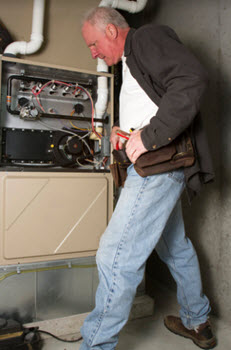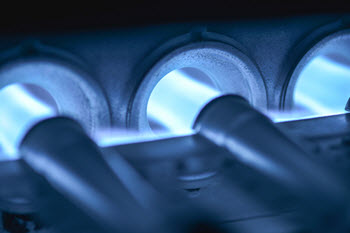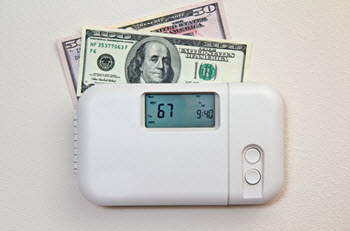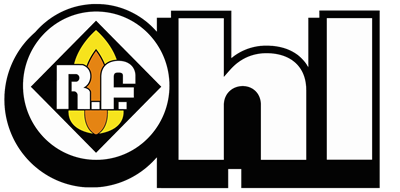Why It’s So Important To Purchase The Right Size Heater For Your Home
 When you get ready to choose your next furnace, you should know that bigger isn’t always better. A lot of homeowners are operating under the mistaken assumption that purchasing a larger heating system will help diminish their regular heating costs.
When you get ready to choose your next furnace, you should know that bigger isn’t always better. A lot of homeowners are operating under the mistaken assumption that purchasing a larger heating system will help diminish their regular heating costs.
Oversized heaters, however, can have a very negative impact on your home heating costs and your HVAC system overall.
More specifically, this purchasing decision can cause your HVAC system to start degrading. Thereby, it will create a broad range of heating problems before the system shuts down entirely. Moreover, it will not be possible to create and maintain a comfortable and healthy indoor environment.
Homeowners who install heating systems that are oversized typically experience higher operational costs and diminished indoor air quality as well.
Additionally, whenever an HVAC system is too big for the home, it leads to a vast range of repairs that would not exist if the system were appropriately sized, to begin with.
Ultimately, installing an oversized heater in your home is a costly decision that far too many consumers make.
Northampton Furnace Replacement: What Happens When Your Heater Is Too Large For Your Home?
Contents
- Northampton Furnace Replacement: What Happens When Your Heater Is Too Large For Your Home?
- Heater Installation: Ductwork & Fuel
- The Humidity Levels Will Constantly Fluctuate In Your Home
- Oversized Furnaces Often Experience Short Cycling
- Temperature Imbalances Throughout The Home: Cold And Hot Spots
- Higher Than Average HVAC Operating Costs
- Noisy & Loud Heating System
- Unrealistic Or Unattainable Efficiency Ratings
- Conclusion
Luckily, there are several signs that can help you determine whether or not your furnace is too large for your home. When you know what to check for, you can identify the proper course of action. Among these signs are:
Heater Installation: Ductwork & Fuel
If you buy a heater that’s unnecessarily large, you will probably need to get extra labor to have your fuel connections adjusted or moved to accommodate the unit. Moreover, if your new heater isn’t fully compatible with the ductwork that you already have, this may need to be replaced or modified before the heater installation as well.
The Humidity Levels Will Constantly Fluctuate In Your Home
To achieve optimum levels of comfort indoors, you have to have humidity levels that are consistent throughout the entire building. Sadly, when heaters are too large, they tend to create regular fluctuations in indoor humidity levels. They produce humidity issues.
To be exact, this is an issue that can increase the likelihood of mold development. Humidity issues can additionally make the indoor environment less comfortable. Also, they can exacerbate a range of respiratory ailments like asthma, allergies and nasal congestion due to increased allergens within the water vapor.
Oversized Furnaces Often Experience Short Cycling
 Short cycling is one of the most common signs that a heater is too large for the property. When your heater is too large, it will warm the living environment up far too rapidly. Given that the remainder of the HVAC system is not designed to accommodate the amount of heat that the oversized furnace quickly generates, the thermostat within this unit will prematurely shut off. It does this to prevent issues with overheating, thereby causing short cycling.
Short cycling is one of the most common signs that a heater is too large for the property. When your heater is too large, it will warm the living environment up far too rapidly. Given that the remainder of the HVAC system is not designed to accommodate the amount of heat that the oversized furnace quickly generates, the thermostat within this unit will prematurely shut off. It does this to prevent issues with overheating, thereby causing short cycling.
Short cycling has the unfortunate effect of increasing wear and tear on your heater, creating frequent breakdowns, and shortening its lifespan. Short cycling also creates dramatic increases in overall heating costs.
Temperature Imbalances Throughout The Home: Cold And Hot Spots
When your furnace is too large for your home, it can create temperature imbalances throughout the living environment. The areas closest to your furnace will be significantly warmer than areas that are further away. You should note that temperature imbalance can cause your heater to start malfunctioning. If you have temperature imbalances throughout your home, you probably have an oversized heater.
Higher Than Average HVAC Operating Costs
 As stated before, short cycling is one common sign that a furnace is oversized. Moreover, short cycling creates higher levels of energy/fuel use and creates higher energy bills. As such, if your heater is too large, you should have a reputable HVAC company replace this unit with a more suitable design.
As stated before, short cycling is one common sign that a furnace is oversized. Moreover, short cycling creates higher levels of energy/fuel use and creates higher energy bills. As such, if your heater is too large, you should have a reputable HVAC company replace this unit with a more suitable design.
Noisy & Loud Heating System
When a furnace is too large for the home, it will often be quite loud given that the existing ductwork will be incapable of supporting it. Although a noisy heater can indicate other problems within the HVAC equipment, it can be a nuisance.
Unrealistic Or Unattainable Efficiency Ratings
In general, a high-performance furnace is going to have a high BTU capacity rating and a high AFUE rating. This, however, is not necessarily the case for high-performance heaters that are oversized. In simpler terms, if your high-performance heater is much too large for your home, it is never going to reach its highest BTU capacity and AFUE ratings. This situation means that you will never be able to enjoy the full benefits of true energy efficiency.
Conclusion
 Signs that your heater is too large for your home include excess noisiness while in use. They also include unrealistic efficiency ratings and increased operating costs. You will notice hot and cold spots throughout the building. Large furnaces create humidity issues, short cycling, and challenges during the install process, among many others.
Signs that your heater is too large for your home include excess noisiness while in use. They also include unrealistic efficiency ratings and increased operating costs. You will notice hot and cold spots throughout the building. Large furnaces create humidity issues, short cycling, and challenges during the install process, among many others.
To avoid these and other issues, work with a qualified HVAC service to determine the correct furnace size for your home ahead of purchase and installation. A seasoned HVAC technician can perform a load calculation for your property, thereby making it easy to find the right heater size.
R.F. Ohl is a reputable HVAC company that you can count on to properly service your home heating system. Our NATE-certified technicians will always provide superior workmanship.
At R.F. Ohl, we provide first-rate HVAC installations, repairs, replacements, and tune-ups. Our expert team has the skills, tools, and experience to give you the most affordable and practical solutions available. Contact our office now, and we’ll happily meet your needs. We additionally offer in-home estimates that are free.
Some of the areas that we service include Catasauqua, Coplay, Northampton, Whitehall and these zip codes 18032, 18037, 18067, 18052 as well as all surrounding areas in Northampton County, Pennsylvania.
Contact us today or give us a call at (610) 377-1098 if you have any questions.